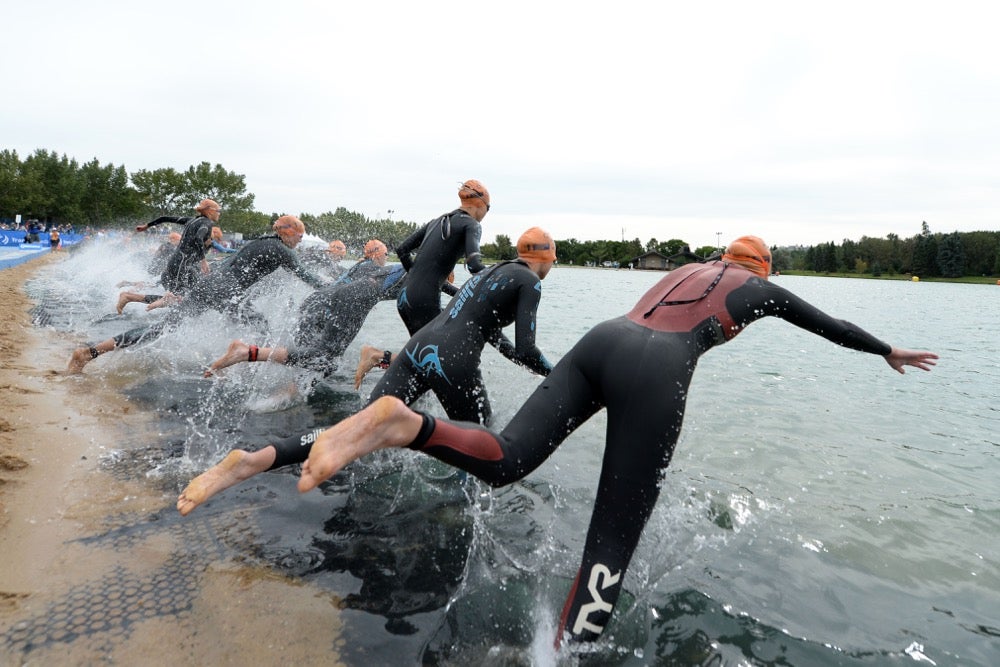Beginner's Luck: Should I Take On This Race?

Photo: Delly Carr/Triathlon.org
Setting big goals is awesome, but how can you we tell when maybe it’s not the right time?
When I told my coach in 2013 that I wanted to do an Ironman, I braced myself for the laughter or, at a minimum, the “I don’t think that’s a good idea” conversation. After all, he knew precisely just how little endurance skill I possessed. To my credit, he knew that I was hard-working, consistent (albeit incredibly slow and talentless) in my workouts, and I had a big ole fat heart when it came to the sport of triathlon. He laid out the risks, the time commitment, and I dropped down the cash equivalent to a mortgage payment to start step one of the long-distance triathlon journey. (By the way, registering for a race means absolutely nothing; registration is the easy part, people! It’s what comes next that’s the real hairball.)
Looking back on my first Ironman, I cannot believe I finished that race. I have no idea how, except for the fact that I refused to stop moving forward, put my entire heart and soul into each wonderful moment on race day and never gave up. As I cried tears of joy through the finish chute 16 minutes before midnight, I knew I had accomplished something impossible (to me) and something I would never forget. However, the athlete I am today—while still fairly talentless—is literally 20 times the athlete I was in 2013, so I still shake my head about that original Ironman. Through this process of training and continuing to race, though, I have learned over the last four years exactly when to step back from the goals I have set (or the goals I am in process of setting) and say, “I am over my head with this season/race/registration; I am going to step back and reassess.”
Picking a big scary goal is something that I LOVE doing, and I think scary-goal picking is an integral part of the triathlon process. That being said, I always do three checks in order to ensure that I can call my own registration bluff and finish said race (or at least put forth my best self so I up the odds of finishing).
1. Reality check
This is the part where I pick the potential race and I scope it out, make the lists, look at the calendar, cross-check it with the school calendar, call the family meeting, pow-wow with the coach (or if I am coach-less, create the training plan), assess my current fitness and where I need to go in order to have a successful race (successful as defined by me, not anyone else), make the budget, look at hotels. Basically, this is the planning phase. If I can’t get out of this phase without a sick feeling in my stomach, then I don’t proceed with that race registration. Oftentimes, this reality check comes even closer to the race (for example, in the case of injury, sometimes the reality check changes and I have to decide at a later date if I should race).
2. Reason check
After the race clears the reality check, I ask myself for the reason why I want to train for and participate in that race. If the actual reason is anything outside of the love of the sport, a desire to improve (for me), a positive challenge or to show my kids that I still “gots it,” then I truly consider leaving it off the calendar. If my motivation ever falls into the category to “show them” or “beat someone” or “shut up the haters,” or any other rationale that doesn’t track closely with the reason I entered this sport in the first place, then I chuck it.
3. Heart and gut check
Finally, I ask myself this question: Is my heart burning and beating for this race? Next, I ask: What is my gut telling me? If, at the registration process (or sometimes even later), I am not totally stoked and excited about the race, then there is no way that I will make it through training for the race. If my stomach is sick from the dread (not the nervous butterflies, but sheer dread), then I pause. If either test fails, then I seriously assess. But if the heart and gut test fails, then I immediately pull the plug on the race.
A caveat to this: Enthusiasm, drive and the like will ebb and flow during the course of training for any event. However, if the large list remains positive, then I consider myself still on the right path, even in the face of adversity such as injury and sickness or family drama. However, if the cons begin to outweigh the pros in a major way, then I go back to the three checks and reassess whether the race is worth it.
Meredith Atwood is a wife, mom, attorney, Ironman, coach and author of Triathlon for the Every Woman. She lives in Atlanta and blogs at SwimBikeMom.com. Find “Beginner’s Luck” every Monday on Triathlete.com.